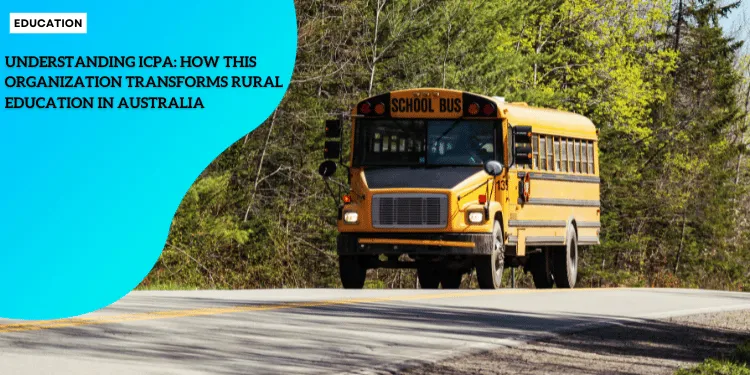Understanding ICPA: How This Organization Transforms Rural Education in Australia

Anúncios
The Isolated Children’s Parents’ Association (ICPA) is a distinctive, far-reaching organization representing over 2,500 families across six Australian states and territories.
Covering from the remote Lord Howe Island to the vast Kimberley, ICPA spans diverse and expansive geographical regions.
Anúncios
This makes the organization unique in its vast coverage and dedicated mission.
ICPA’s members are as varied as Australia’s landscape.
Anúncios
They include rural community members, primary producers, small business owners, and educational institutions.
These members all share a common goal: to ensure that children in remote areas receive the same quality education as those in metropolitan areas.
This commitment was epitomized by Amanda Murphy, a publicity officer from the Northern Territory, who joined ICPA to advocate for equitable education access for rural students.
Living in remote areas poses educational challenges for families like those of Amanda Murphy and Hollie Williams, members deeply involved with ICPA.
These individuals know first-hand the difficulties of balancing education access with the vast distances between home and school, especially when boarding schools, secondary homes, and distance education are often necessary solutions.
As the organization represents a broad spectrum of needs, its branches work hard to bring local concerns to state and federal councils.
These councils collaborate with policymakers and educational institutions, striving for beneficial policies and resources for all ICPA members.
With its extensive reach and dedicated membership, ICPA continually adapts to the evolving educational landscape of rural Australia, advocating for better support and resources to overcome the unique challenges faced by isolated families.
Educational Challenges in Remote Australia
Geographical Isolation
Living in remote parts of Australia brings unique educational challenges.
One of the primary issues is geographical isolation. Families living far from urban centers often find it difficult to access quality educational resources.
For students like Hollie Williams’ daughter, Magenta, who is homeschooled and connected to School of the Air, schooling happens just a few meters from her front door.
Conversely, Magenta’s brother commutes almost 1,000 kilometers to attend boarding school in Adelaide. This stark contrast underlines the logistical hurdles that families face.
Travel Distances
Significant travel distances to educational facilities are a major hindrance.
For families like the Murphys, living on vast cattle stations means that even basic commutes for educational purposes can be daunting.
Amanda Murphy’s children split their time between boarding school and distance education from the Katherine School of the Air—highlighting the sheer volume of travel involved.
This long-distance travel is costly, time-consuming, and physically exhausting for both children and their parents.
Limited Access to Specialized Support
Rural students often face a lack of specialized educational support services.
In these remote areas, getting a diagnosis or assistance for learning difficulties means adding the cost and logistics of travel and accommodation to an already complex situation.
Such barriers can delay essential evaluations and interventions, affecting children’s educational development and emotional well-being.
Addressing these needs usually requires significant financial and personal sacrifices from families.
These challenges deeply impact the lives of families in remote Australia.
Navigating these obstacles is part of everyday life for the members of ICPA, who continually strive for better outcomes and support systems.
ICPA’s Family Support Models
Support for Families with Children in Boarding Schools
The journey of remote families sending children to boarding schools often begins with a difficult decision.
The geographical isolation necessitates early separation, causing significant emotional strain.
These families aren’t just sending their children miles away but sometimes thousands of kilometers.
For example, one mother recounts how it takes a minimum of two days off work to get her son to a school 1,000 kilometers away.
Recognizing these challenges, ICPA offers comprehensive support through their network by providing emotional backing and practical advice for parents and children navigating this new terrain.
Assistance for Families Maintaining Second Homes in Towns for Education
To tackle the accessibility issues, some families split their residences, maintaining a second home closer to educational facilities.
This arrangement allows children daily school access but comes with its own set of challenges, including financial burdens and parental separation during school terms.
ICPA assists these families by advocating for financial aid and flexing its local branches’ organizational muscle to help families adjust to the dual-home lifestyle.
It ensures that parents remain connected with their children’s education and that families do not feel isolated despite the physical distance.
Guidance for Distance Education and Home-Schooling Arrangements
For countless remote families, distance education and home-schooling represent the most viable means of providing quality education.
Many parents juggle their work responsibilities while acting as educators, which can be overwhelming.
ICPA steps in by offering indispensable guidance on home-schooling resources and best practices.
They also facilitate connections with tutors and mentor families on utilizing technologies essential for distance education, ensuring that even the remotest children receive a caliber of education comparable to their urban counterparts.
This holistic support system underscores the ICPA’s commitment to aiding families in overcoming the educational hurdles posed by Australia’s vast landscapes.
As families tackle these challenges, the next step involves addressing the financial and logistical impacts associated with remote education.
Financial and Logistical Impacts
High Costs of Education in Remote Areas
Rural families often face overwhelming costs when pursuing education.
Travel, accommodation, and vehicle maintenance weigh heavily on budgets, especially when children attend boarding schools.
Families may need to drive vast distances, sometimes up to 1,000 kilometers, just for school commutes.
These journeys take significant time and incur costs related to fuel and vehicle upkeep, further straining families already dealing with geographic isolation.
Financial Burdens of Boarding and Distance Learning
Boarding schools, a common education option in remote areas, come with hefty price tags, potentially making them financially unattainable for some families.
Additionally, those opting for distance education may need online resources, technology, and possibly in-home tutors, all contributing to extra financial pressure.
This makes equitable access to quality education a goal that requires concerted effort and support.
Limited Access to Specialized Services
Another critical challenge for remote families is securing specialized educational services.
Traveling long distances for assessments or treatments can result in significant travel expenses and personal strain.
These circumstances underline the importance of support networks and advocacy to help families navigate such logistical hurdles.
Recognizing these challenges is key to understanding the complexities faced by families in remote Australia.
These financial and logistical issues resonate deeply in their daily lives, connecting closely to the dynamics and emotional fabric of families spread across vast distances.
This paints a vivid picture of the trials faced by these communities, linking naturally to the broader social and family considerations they must also manage.
Family Dynamics and Social Considerations
Impact of Early Separation
Remote families in Australia face significant challenges when it comes to education, often leading to early separation as children leave for boarding schools.
It’s not uncommon for kids as young as eleven to head off to boarding school, causing a profound shift in family dynamics.
This early separation is tough on both parents and children. Children miss the comfort of their own beds, siblings, and the daily warmth of family life.
For parents, particularly mothers, it’s a crushing blow not to be able to hug their child when they’re upset or unwell, knowing their child feels the same loneliness and distress.
Challenges of Maintaining Family Connections
Maintaining family connections across vast distances is another hurdle. Parents might have to travel up to 1,000 km just to attend school events or bring their child home for a weekend.
This constant travel demands time off work and hefty expenses on fuel, accommodation, and vehicle upkeep. As a result, regular family reunions become few and far between, often leading to feelings of disconnection for both parents and children.
Emotional Challenges
The emotional strain of this separation is immense.
Children in boarding schools may experience feelings of homesickness, loneliness, and anxiety, while parents grapple with guilt and worry about their child’s well-being and emotional state.
Constantly being apart means issues that arise can’t be addressed face-to-face, making it even harder to provide the necessary emotional support.
Parents miss out on witnessing everyday milestones and sharing in their child’s successes and challenges, adding another layer to the emotional toll.
ICPA is aware of these intricate dynamics and strives to nurture a support network that alleviates the emotional strain.
By organizing social gatherings and other community-building initiatives, ICPA plays a crucial role in fostering a sense of belonging and solidarity among these geographically isolated families.
Communities remain close-knit thanks to ICPA’s efforts, bridging the physical distance with emotional connectivity.
ICPA’s Community Building Initiatives
Organization of Regular Meetings and Social Gatherings
The Isolated Children’s Parents’ Association (ICPA) understands the importance of maintaining a strong community network for families living in remote areas.
To foster this, ICPA organizes regular meetings and social gatherings.
These events are crucial for parents and educators to share their experiences, discuss challenges, and offer support to one another.
By getting together, families can work collectively to address common issues related to remote education and create a sense of belonging.
Coordination of Sports and Cultural Camps for Isolated Children
One of the key initiatives by the ICPA is the coordination of sports and cultural camps.
These camps are designed to provide children living in isolation with opportunities to interact with their peers, develop their social skills, and participate in diverse activities that they might not otherwise have access to.
Activities can range from traditional sports to engaging in various cultural practices, offering a well-rounded experience that helps in the overall development of the children.
Creation of Support Networks for Families Facing Similar Challenges
ICPA’s efforts extend beyond social events and camps; they also focus on establishing robust support networks.
These networks bring together families facing similar challenges associated with remote education, whether that involves distance learning, boarding schools, or homeschooling.
By connecting these families, the ICPA helps reduce feelings of isolation and empowers them to share resources, advice, and emotional support.
Through these community-building initiatives, ICPA ensures that families do not feel alone in their educational journey.
These efforts create a strong, connected community capable of overcoming the unique challenges posed by geographical iso






